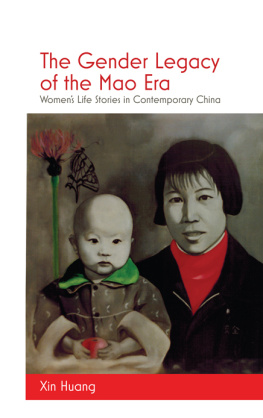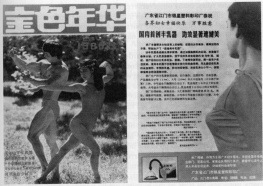A

BOOK
The Philip E. Lilienthal imprint
honors special books
in commemoration of a man whose work
at the University of California Press
from 1954 to 1979
was marked by dedication to young authors
and to high standards in the field of Asian Studies.
Friends, family, authors, and foundations have together
endowed the Lilienthal Fund, which enables the Press
to publish under this imprint selected books
in a way that reflects the taste and judgment
of a great and beloved editor.
The publisher gratefully acknowledges the generous support
of the Philip E. Lilienthal Asian Studies Endowment Fund
of the University of California Press Foundation, which
was established by a major gift from Sally Lilienthal.
The Gender of Memory
ASIA PACIFIC MODERN
Takashi Fujitani, Series Editor
1. Erotic Grotesque Nonsense: The Mass Culture of Japanese Modern Times, by Miriam Silverberg
2. Visuality and Identity: Sinophone Articulations across the Pacific, by Shu-mei Shih
3. The Politics of Gender in Colonial Korea: Education, Labor, and Health, 19101945, by Theodore Jun Yoo
4. Frontier Constitutions: Christianity and Colonial Empire in the Nineteenth-Century Philippines, by John D. Blanco
5. Tropics of Savagery: The Culture of Japanese Empire in Comparative Frame, by Robert Thomas Tierney
6. Colonial Project, National Game: A History of Baseball in Taiwan, by Andrew D. Morris
7. Race for Empire: Koreans as Japanese and Japanese as Americans during World War II, by T. Fujitani
8. The Gender of Memory: Rural Women and Chinas Collective Past, by Gail Hershatter
9. A Passion for Facts: Social Surveys and the Construction of the Chinese Nation State, 19001949, by Tong Lam
The Gender
of Memory
Rural Women and Chinas Collective Past

Gail Hershatter

University of California Press, one of the most distinguished university
presses in the United States, enriches lives around the world by advancing
scholarship in the humanities, social sciences, and natural sciences. Its
activities are supported by the UC Press Foundation and by philanthropic
contributions from individuals and institutions. For more information,
visit www.ucpress.edu .
University of California Press
Berkeley and Los Angeles, California
University of California Press, Ltd.
London, England
2011 by The Regents of the University of California
Library of Congress Cataloging-in-Publication Data
Hershatter, Gail.
The gender of memory : rural women and Chinas collective past / Gail Hershatter.
p. cm. (Asia Pacific modern ; 8)
Includes bibliographical references and index.
ISBN 978-0-520-26770-1 (cloth : alk. paper)
1. Rural womenChinaShaanxi ShengSocial conditions.
2. Rural womenChinaShaanxi ShengEconomic conditions.
3. SocialismChinaShaanxi ShengHistory. I. Title.
HQ1769.S433H47 2011
305.48'89510514309045dc22 2010052235
Manufactured in the United States of America
20 19 18 17 16 15 14 13 12 11
10 9 8 7 6 5 4 3 2 1
This book is printed on Cascades Enviro 100, a 100% post consumer waste,
recycled, de-inked fiber. FSC recycled certified and processed chlorine free.
It is acid free, Ecologo certified, and manufactured by BioGas energy.
For Gao Xiaoxian
CONTENTS
ACKNOWLEDGMENTS
A book fifteen years in the making marks a longish phase in a life. Since this one is, in part, a book about memory, finishing it seems to require at least a brief backward glance from the author. World events, the domestic time of my household, and the daily rhythms of work time in my university have all changed across the past decade and a half. I can name and arrange temporalities of all kinds: rupture, accretion, progress, decline, crisis, milestone, routine. When I try to imagine how I might give an account of this time span, how I might answer the sort of questions I blithely put to Chinese village women and men, the mind boggles, and I am impressed all over again with their narrative capacities and their patience. My first thanks goes to them.
The research for this book was only possible because of the intellectual acumen, curiosity, commitment, and endless competence of Gao Xiaoxian. I still marvel at my great good luck in finding her, and at her willingness to deal with the complications of taking me to Shaanxi villages over a ten-year period. Our research has been fully collaborative, and our discussions since 1992 have been one of the greatest pleasures and learning experiences of my life, but I take full responsibility for the ideas expressed in this book. I look forward to the book she plans to write based on our joint interviews, when her daily responsibilities to the organization she runs for Shaanxi women ( www.westwomen.org ) become less pressing. This book is dedicated to her.
Although I have spent thousands of solitary hours with the materials that undergird this book, the process of working on it has done away with any lingering notions I may have had that a historian works alone. In China, the Shaanxi Provincial Womens Federation was a generous host, and the Shaanxi Provincial Archives staff were helpful in locating materials. Ning Huanxia (1996), Wang Guohong (1997), Zhao Chen (1999), Yang Hui (2001), Yu Wen (2004), and Peng Jingping (2006) provided invaluable assistance on village visits recording and deciphering interview notes; Wang Guohong also conducted interviews of her own on our 1997 trip. Gao Danzhu accompanied me on a return visit to Village G in 2004. Zhao Yugong was an inexhaustible source of information about all matters of custom and local history stretching back to the Neolithic period, as well as pseudonyms for our interviewees. Jin Yihong helped arrange a visit to the Number Two Archives in Nanjing, and Yang Di and Li Yaqin assisted in collecting materials there.
Major grants from the Pacific Rim Research Program of the University of California (199496) and the U.S.-China Cooperative Research Program of the Henry Luce Foundation (19952001) enabled this research. A period of research and writing in 20001 was partially supported by a Presidents Research Fellowship in the Humanities, University of California; a fellowship from the National Endowment for the Humanities, an independent federal agency; and a Chiang Ching-kuo Foundation Senior Scholar Research Grant. Support for research assistance in 2000 was provided by a Special Research Grant from the Committee on Research, UC Santa Cruz. Fellowships from the John Simon Guggenheim Foundation and the Center for Advanced Study in the Behavioral Sciences (CASBS), Stanford University, in conjunction with sabbatical leave from UC Santa Cruz, made it possible for me to draft the book in 20078. CASBS provided a year in an incomparable setting with a wonderful community of scholars. I thank the colleagues who took time to recommend me for these fellowships: Timothy Brook, Paul Cohen, Susan Mann, Kenneth Pomeranz, and Anna Tsing. I was fortunate to participate in a writing group at CASBS with Paula Findlen, Sarah Maza, Katie Trumpener, and Julie Hochstrasser, although we were completely unsuccessful at weaning each other from our attachment to endless detail. Fred Turner and Tanya Marie Luhrman were also engaged and helpful interlocutors during that year of writing.
Next page





